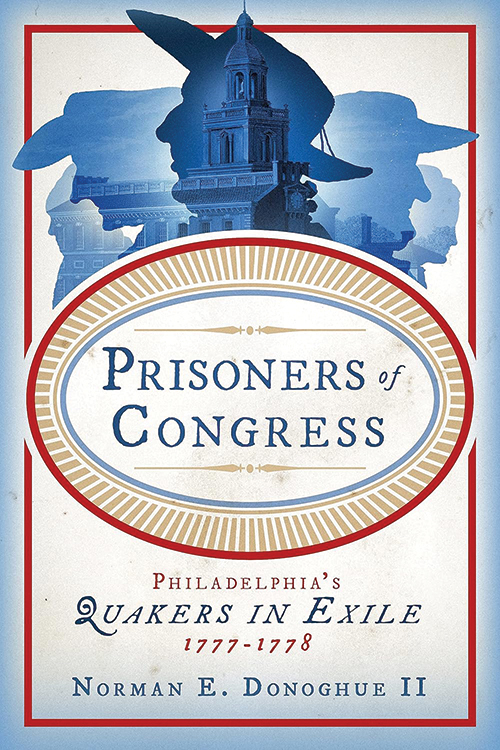
Prisoners of Congress: Philadelphia’s Quakers in Exile, 1777–1778
Reviewed by Cameron McWhirter
November 1, 2023
By Norman E. Donoghue II. The Pennsylvania State University Press, 2023. 288 pages. $44.95/hardcover; $35.99/eBook.
Societal pressures caused by war can lead majorities in a community to see once-tolerated minorities and dissenters as enemies and spies. Majorities far too often use governmental powers to go after these groups under the guise of patriotism. Fairness and decency are sacrificed to fear.
The United States has often struggled with this phenomenon in times of national crises. Abraham Lincoln suspended the right of habeas corpus and restricted freedom of the press. Woodrow Wilson’s administration arrested dissenters during World War I and deported U.S. citizens. The United States interned thousands of people of Japanese descent during World War II. The Red Scare witch hunts of the 1950s destroyed careers from Washington to Hollywood.
In Prisoners of Congress, Norman E. Donoghue II brings to light a little-known episode of the American Revolution in which the Commonwealth of Pennsylvania and the Continental Congress upended the lives of 20 Philadelphia men—17 of them Quakers in good standing—based on groundless suspicions and a disregarding of the men’s basic legal rights. In his meticulous history, Donoghue documents how the revolutionary government arrested the men without any charges or hearings, despite their repeated objections and pleadings. The men were then forced to travel under guard to Winchester, Va., and live there—at their own expense—for months while their families struggled with hardships at home. Some of the exiles died before they were allowed to return; two fled. Others found that when they came back to Philadelphia, their lives were damaged ever after by the experience.
Donoghue devoted years to uncovering the story of this banishment, and his hard work has paid off. He provides important context and shows how many patriots distrusted Quakers because they refused to fight, swear loyalty oaths, or use Continental currency. Many patriots considered Quakers to be British spies. One Continental army officer declared that Quakers were “the most Dangerous Enemies America knows.” Thomas Paine blasted them as “antiquated virgins” whom he considered traitors.
The events of the exile have been touched on before in other histories and were fictionalized in Quaker author Elizabeth Gray Vining’s 1955 novel The Virginia Exiles. But never have the struggles of this early group of American political prisoners been so thoroughly documented, with extensive use of primary material. Donoghue argues persuasively that the then provisional government’s exile of the Quakers set a worrisome example for religious, racial, and political minorities, just as the young republic was being born. Donoghue writes:
Laden with questions about the relationships among religion, the citizen’s duties to government, and civil liberties during wartime, the exile appears in hindsight as both a cautionary tale and an unfortunate precedent for future generations of Americans.
The flimsy excuse for the investigation and subsequent arrest (again, without any formal charges or judicial proceedings) of the Philadelphia men was the “discovery” of supposed papers detailing Quaker treachery with the British Army from the “Spanktown Yearly Meeting” in Rahway, N.J. As Quakers were quick to point out when the alleged documents surfaced, there was no Spanktown Yearly Meeting. The documents also didn’t use numbers to refer to days of the week or months, showing they clearly were not written by Quakers.
But the first casualty in war is the truth. The sloppy forgeries served a clear political purpose for patriots: suppressing Quaker dissent in the capital of a new nation in the midst of a war. Prominent Quakers were shuffled off without so much as a hearing. Those arresting the men were ordered to confiscate any weapons; of course, they found none.
The story has multiple twists and turns, including battles, the wives of the exiled who petitioned government leaders, and legal and political machinations—all handled deftly by Donoghue. His tale involves a host of other Quakers, including abolitionist Warner Mifflin (see my review of Gary Nash’s biography in FJ Apr. 2018), as well as founding fathers George Washington, Benjamin Franklin, and Alexander Hamilton.
Though the Religious Society of Friends would eventually repair its relationship with the U.S. government, it would never regain political power in Philadelphia or Pennsylvania. Future Quakers, from abolitionists to conscientious objectors to civil rights activists to war protesters, would face similar challenges to those faced by the Virginia exiles as they encountered governmental actions that were employed to squelch dissent in times of national crisis. As Donoghue writes, “Political chicanery in service of the persecution of minorities once commenced is not easily contained, then or now.”
Cameron McWhirter is a journalist and coauthor of the recently released American Gun: The True Story of the AR-15. He is also the author of Red Summer: The Summer of 1919 and the Awakening of Black America. A member of Atlanta (Ga.) Meeting, he has served on the board of trustees for Friends Publishing Corporation. Website: cameronmcwhirter.com.
1 thought on “Prisoners of Congress: Philadelphia’s Quakers in Exile, 1777–1778”
Leave a Reply
Comments on Friendsjournal.org may be used in the Forum of the print magazine and may be edited for length and clarity.



Excellent Book! Highly recommended to read and to learn and to ponder about History of America.
Gratitude,
Paulina Naisteter